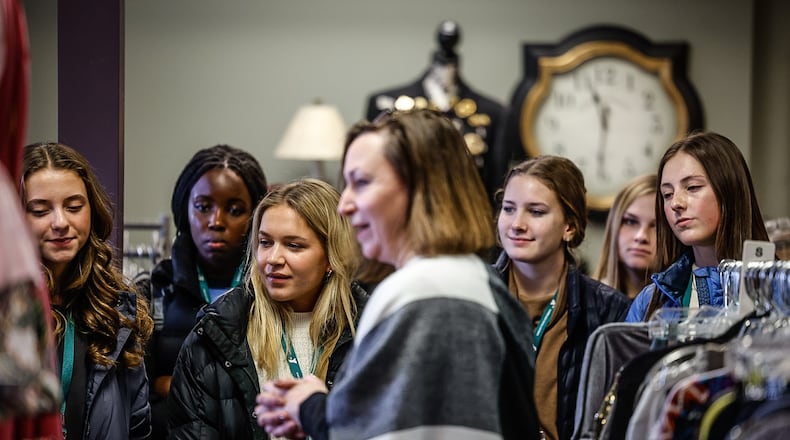“I saw this as a great opportunity to become a better leader myself, and I think it’s a great way to improve the community and to learn how to become a better person as I get older and look to the future,” she said. “I wanted to learn about different volunteer opportunities and what these organizations do in Dayton, specifically for the youth because that’s very important for our future.”
A junior at Oakwood High School, Woessner has participated alongside 11th graders from eight local schools as part of the Junior Leadership Dayton program, which focuses on preparing the next generation of leaders for constructive participation in community activities.
Throughout the nine-month program — which is spearheaded by the YWCA and sponsored by The Dayton Foundation, Wright State University and YMCA of Greater Dayton — students learn about specific areas of leadership in the community while developing values like honesty, respect, and responsibility, according to organizers.
The program is comprised of seven sessions, conducted one Friday per month from September to April. Each session is held at various community locations and focuses on selected topics representing key leadership skill areas.
During each session, participants are introduced to issues through lectures, on-site visits, group discussions and simulations.
Upon completion of the sessions and accompanying assignments, which includes a service project, participants who enroll at Wright State University earn three hours of credit and a small scholarship, according to WSU professor Scott Williams, who helps facilitate the program.
On Friday, students visited Daybreak, a youth and social services organization; Clothes That Work, a non-profit that provides professional clothing, image counseling and training for job seekers in Montgomery County; Habitat of Humanity of Greater Dayton; and El Puente Educational Center, an organization focused on community development education, and social and civic engagement for local families who trace their heritage to a variety of Latin American nations.
“It’s about learning of all the needs and issues in the community and getting them exposed because sometimes unless you visit and talk to the people (affected), you may not know these issues or needs exist,” said Tania Arseculeratne, community engagement officer for The Dayton Foundation. “It’s also about how these young leaders in the community can get involved in a volunteer role now or in the future.”
Dayton Regional STEM School student Joseph Wright said the program has allowed him to learn firsthand the various ways community leadership can manifest, how nonprofit organizations differ in their operations compared to normal businesses, and how he can meaningfully get involved in philanthropic efforts both now and in the future.
“It’s something that’s really hard to learn about in a normal school curriculum,” he said, adding that he feels his fellow classmates as a whole tend to show an interest in learning how they can positively benefit their community.
“They’re interested in and care about problems in the world and they want to become more educated, but also they want to do something constructive towards those problems as part of their life goals,” Wright said.
Woessner said she sees a similar sentiment among her peers.
“I think it’s just part of human nature to want to help people,” she said.
About the Author

